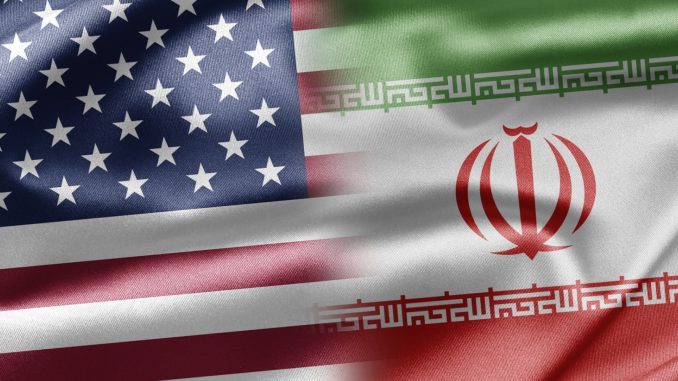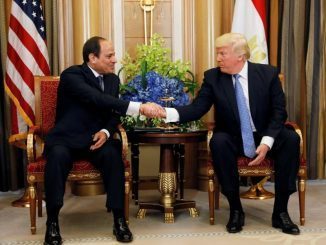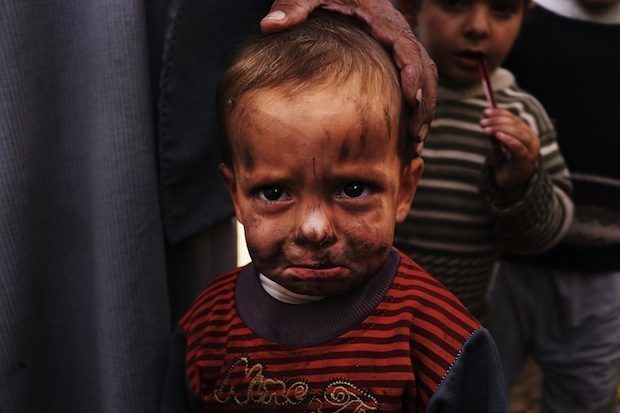
US lawmakers voted to delay newly imposed sanctions on Iran as the Iranian elections, which may witness a significant change in Iran’s foreign policy, became closer.
Iran made a historic nuclear deal with P5+1 powers in 2015, in which Tehran agreed to amend its nuclear output in order to lift all nuclear-related economic sanctions, freeing up tens of billions of dollars in oil revenue and frozen assets.
After lifting the sanctions, Iranian president Hassan Rouhani visited Europe and made deals that worth billions of dollars. European companies started looking for investment opportunities in the growing Iranian market.
However, Donald Trump has said during his election campaign that Iran’s nuclear deal as “disastrous” and said it would be his “number one priority” to dismantle it.
These threats became clearer after Trump’s inauguration, as he signed an executive order temporarily barring thousands from seven countries in the Middle East and Africa, including Iran, from obtaining visas to travel to the United States.
The tension was raised again in issues related to Iran’s ballistic program, as he said that “Iran is playing with fire” and announced that “we’re officially putting Iran on notice,” after Iran conducted a failed ballistic missile test.
In addition, Trump declared in January applying sanctions on 25 individuals and companies connected to Iran’s ballistic missile program and those providing support to Iran’s Islamic Revolutionary Guard Corps’ Quds Force.
Recently, US senators said plan to impose new sanctions on Iran over its ballistic missile program, while Israel and Saudi Arabia backed these measures and described Iran as the main sponsor of global “terrorism” and a destabilizing force in the Middle East.
New sanctions delayed
A group of Democratic and Republican senators introduced the bill in March seeking to impose tighter U.S. sanctions on Iran over ballistic missile launches and other non-nuclear activities, echoing a harder line on Tehran espoused by Republican President Donald Trump.
But on Tuesday, the Republican chairman of the Senate Foreign Relations Committee, Bob Corker, said the bill would not move forward for now.
“We’ve got Iran sanctions bill that has a number of co-sponsors that wasn’t able to markup at present because of concerns about how the European Union might react and (Iranian) elections that are coming up,” Corker said during a hearing on the EU as a U.S. partner in dealings with Russia.
A markup is when a committee meets to debate legislation and to consider amendments.
Corker was a co-sponsor of the new sanctions bill, as were several other Democratic and Republican members of the Foreign Relations Committee.
The lawmakers who wrote the bill said it had been written specifically not to interfere with the nuclear accord.
But Iran has suggested that it would consider past proposed sanctions bills violations of the international pact reached during the administration of former U.S. President Barack Obama, a Democrat.
Every Republican in the U.S. Congress opposed the nuclear agreement, and Trump said he will tear it down. However, the latest vote and Trump’s administration’s tone towards a more strict deal rather than a canceled one may reflect the US new policy and the careful steps it will take until the Iranian election results appear.
Pressure on Rouhani
As he has campaigned for the new elections, Rouhani has called for greater individual freedoms and highlighted as a signature achievement the 2015 diplomatic breakthrough reached with the United States and other world powers, in which Iran curbed its nuclear program in exchange for relief from international sanctions.
The US has put Rouhani under fire more than once in past, but as the elections come closer, he seems to be the best candidate in comparison with the alternative, the hardliners, who are well-known for their hostile policy towards Europe and the US.
Fingers are being pointed at Rouhani from almost every direction. The blame has also been attributed to the technocrat team he chose who are mainly western-educated politicians, including Iran’s foreign minister, Javad Zarif.
One group, in particular, is more empowered and feels fully vindicated in pointing towards Rouhani’s failures: the hardliners. The hardliners are mainly the judiciary system, the Revolutionary Guard Corps, and its five forces, including the Quds Force and Basij, the Ministry of Intelligence, the Assembly of Experts and Ayatollah Ali Khamenei, the Supreme Leader.
Recently, Iran’s supreme leader rebuked Rouhani for failing to fulfill his promises on improving the economy. Khamenei stated: “We receive complaints from people. … People should feel improvements regarding the creation of jobs and manufacturing. It is not the case now.”
The timing of Khamenei’s speech was intriguing as it came soon after the International Monetary Fund’s recently released report on Iran’s economy. The executive board of the IMF commended the Iranian authorities for “achieving an impressive recovery in economic growth after the lifting of nuclear sanctions in 2016..”
The senior cadre of the Revolutionary Guards has also become more unrestrained as they argue Rouhani’s agenda of rapprochement with the United States and the West has failed. Ayatollah Ahmad Jannati, the head of the assembly of experts that selects Iran’s supreme leader, lashed out at Rouhani’s failure to improve the economy as well.
Rouhani’s attempts to attract foreign investment on a large scale had not materialized. Khamenei rebuked Rouhani: “Attracting foreign investment is a positive measure but so far a very limited [number] of foreign contracts have materialized.”
Hardliners are capitalizing on the heightened tensions in the last months between Iran and the US and hope to stop Rouhani from becoming president for another four years.
Most of Iran’s newspapers, which are owned by the hardliners, have also started a campaign to highlight Rouhani’s failures in domestic, foreign, and regional policies.
Therefore, it may be a wise step for the US to delay any future moves against Iran, to decrease the pressure that may be put on Rouhani afterward, and to ensure that his voice might be heard by the Iranian voters who could bring him to win a second term, relieving the US from a new burden.



